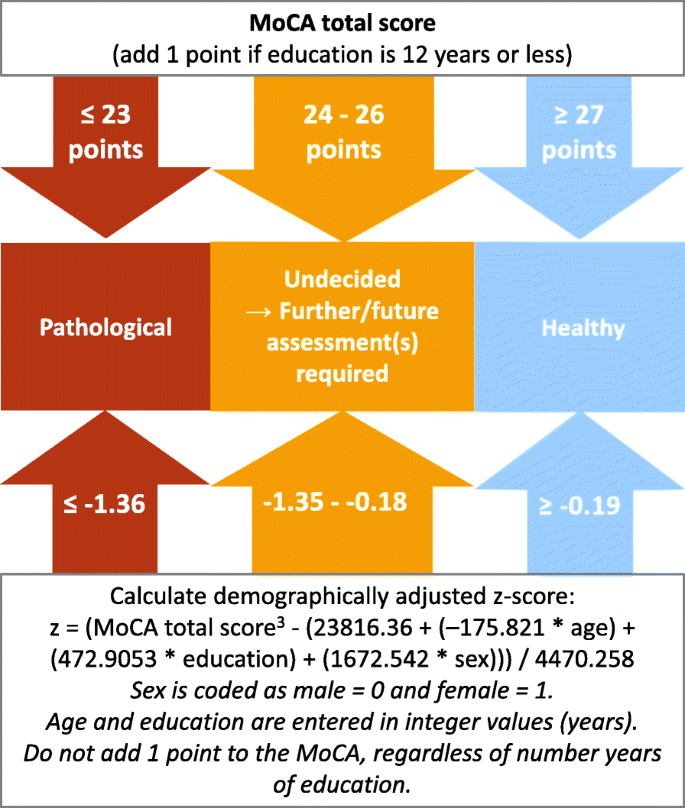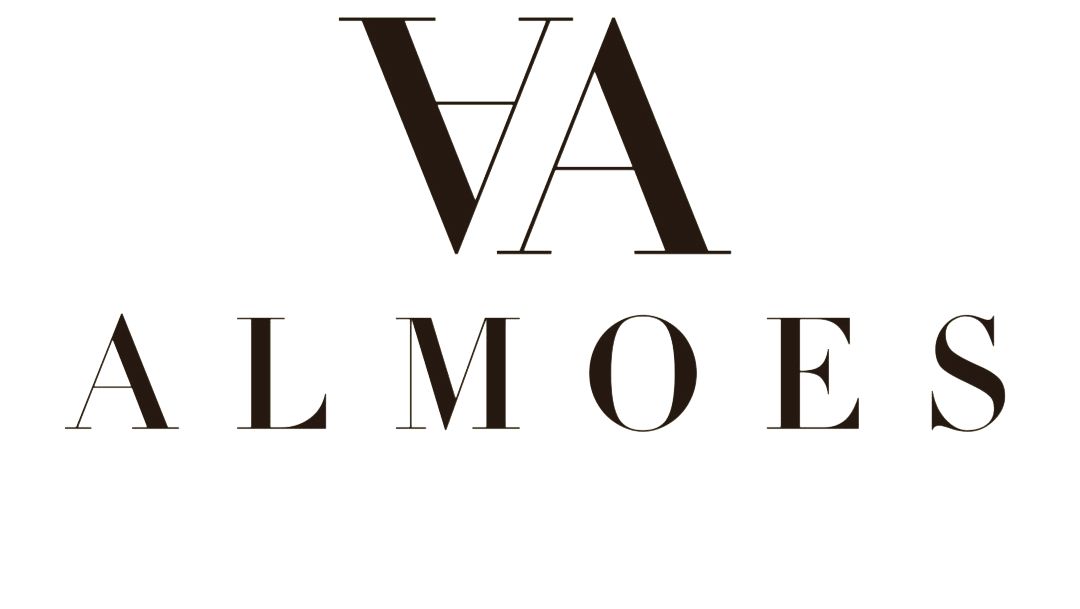Montreal Cognitive Assessment score
The Montreal Cognitive Assessment (MoCA)

The Montreal Cognitive Assessment (MoCA) is a cognitive screening tool that assesses various cognitive domains, including attention, memory, language, visuospatial abilities, and executive functions. The maximum score on the MoCA is 30, with higher scores indicating better cognitive functioning.
A MoCA score of 26 or higher is generally considered normal or healthy cognitive functioning for most individuals. However, it's important to note that the interpretation of MoCA scores should be done in the context of an individual's age, education level, and other relevant factors. Additionally, a MoCA score is only one aspect of a comprehensive cognitive evaluation, and further assessment may be needed to fully evaluate an individual's cognitive functioning.
The Montreal Cognitive Assessment (MoCA) is a brief cognitive screening tool that assesses various cognitive domains, including:
- Visuospatial/executive functions: This domain assesses an individual's ability to perceive and manipulate visual information, as well as their ability to plan and execute complex tasks.
- Naming: This domain assesses an individual's ability to name objects and animals.
- Memory: This domain assesses an individual's ability to learn and recall information, including immediate and delayed recall.
- Attention: This domain assesses an individual's ability to sustain attention and concentrate on tasks.
- Language: This domain assesses an individual's ability to understand and use language, including verbal fluency and comprehension.
- Abstraction: This domain assesses an individual's ability to think abstractly and make inferences.
- Delayed recall: This domain assesses an individual's ability to recall information after a delay.
The MoCA test consists of 30 items, and each item is worth one point, resulting in a maximum score of 30. The test takes approximately 10-15 minutes to administer and is designed to be used by a trained healthcare professional.
It's important to note that the MoCA is a screening tool and is not a diagnostic instrument. If an individual scores below the established cut-off, further assessment and evaluation are needed to confirm a diagnosis of cognitive impairment. Additionally, MoCA scores should be interpreted in the context of an individual's age, education level, cultural and linguistic background, and medical history
Advantages vs. Disadvantages
Advantages of the Montreal Cognitive Assessment (MoCA) include:
- Quick and easy to administer: The MoCA is a brief and easy-to-administer test that takes only 10-15 minutes to complete, making it an efficient way to screen for cognitive impairment.
- Assess a range of cognitive domains: The MoCA assesses various cognitive domains, including attention, memory, language, visuospatial abilities, and executive functions, providing a comprehensive assessment of an individual's cognitive functioning.
- Validated in diverse populations: The MoCA has been validated in various populations and cultural contexts, making it a useful tool for assessing cognitive functioning across diverse groups.
- Can identify mild cognitive impairment: The MoCA can identify mild cognitive impairment, which is an early stage of cognitive decline and can indicate the risk of developing dementia.
However, there are also some potential disadvantages of the MoCA, including:
- Limited diagnostic value: The MoCA is a screening tool and is not a diagnostic instrument. Further evaluation and testing are necessary to confirm a diagnosis of cognitive impairment.
- Affected by various factors: MoCA scores can be influenced by various factors, including age, education level, cultural and linguistic background, and medical conditions or medications, making it essential to interpret scores in the context of an individual's unique circumstances.
- Limited sensitivity for some cognitive domains: The MoCA may have limited sensitivity for some cognitive domains, such as executive functions, and may miss some cases of cognitive impairment in these areas.
In summary, the MoCA is a useful cognitive screening tool that has several advantages, including being quick and easy to administer, assessing a range of cognitive domains, and being validated in diverse populations. However, it also has some potential limitations, such as limited diagnostic value and sensitivity for some cognitive domain
References that you may find helpful for further information on the Montreal Cognitive Assessment (MoCA):
- Nasreddine, Z. S., Phillips, N. A., Bédirian, V., Charbonneau, S., Whitehead, V., Collin, I., ... & Chertkow, H. (2005). The Montreal Cognitive Assessment, MoCA: a brief screening tool for mild cognitive impairment. Journal of the American Geriatrics Society, 53(4), 695-699.
- Carson, N., Leach, L., & Murphy, K. J. (2018). A re-examination of Montreal Cognitive Assessment (MoCA) cutoff scores. International Journal of Geriatric Psychiatry, 33(2), 379-388.
- Ciesielska, N., Sokołowski, R., Mazur, E., Podhorecka, M., & Polak-Szabela, A. (2016). Validation of the Polish version of the Montreal Cognitive Assessment (MoCA-P) in Parkinson's disease patients. Journal of the Neurological Sciences, 368, 127-131.
- Malek-Ahmadi, M., & Davis, K. (2015). The Montreal Cognitive Assessment (MoCA) for Alzheimer's Disease Screening in Primary Care: A Systematic Review. Journal of Alzheimer's Disease & Parkinsonism, 5(3), 194.
- Pendlebury, S. T., Cuthbertson, F. C., Welch, S. J., Mehta, Z., & Rothwell, P. M. (2010). Underestimation of cognitive impairment by Mini-Mental State Examination versus the Montreal Cognitive Assessment in patients with transient ischemic attack and stroke: a population-based study. Stroke, 41(6), 1290-1293.
links to resources related to the Montreal Cognitive Assessment (MoCA) that you may find helpful:
- MoCA website: https://www.mocatest.org/
- This website provides information about the MoCA test, including how to administer and score the test, training and certification for healthcare professionals, and resources for patients and caregivers.
- MoCA Test App: https://www.mocatest.org/moca-test-app/
- This app is available for download on iOS and Android devices and provides a digital version of the MoCA test that can be administered by a trained healthcare professional.
- Alzheimer's Association: https://www.alz.org/alzheimers-dementia/what-is-dementia/brain_tests
- The Alzheimer's Association provides information about different types of cognitive tests, including the MoCA, and how they are used to assess cognitive functioning.
- National Institute on Aging: https://www.nia.nih.gov/health/cognitive-health-and-older-adults



